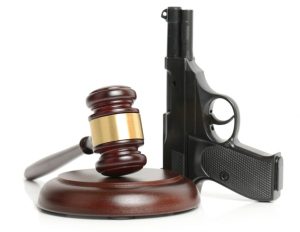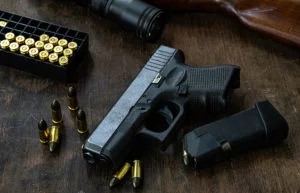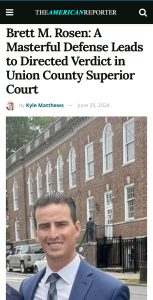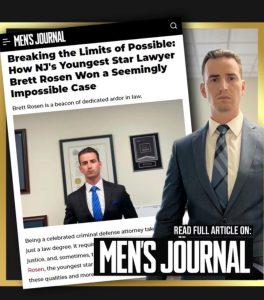Will I Serve Time for a Gun Crime in Union County, NJ? A Comprehensive Guide by Brett M. Rosen, Esq.
Gun Crime Defense Attorney in Union County, NJ

Will I Serve Time on a Gun Crime in Union County, NJ?
The Harsh Reality of Gun Crimes in Union County, New Jersey
If you’re facing a gun charge in Union County, New Jersey, the prospect of jail time looms large. New Jersey boasts some of the strictest gun laws in the nation, and the consequences of a conviction can be severe. The simple act of possessing a firearm without the proper permits can land you behind bars.
Retaining Brett M. Rosen, Esq. for your gun crime case in Union County, NJ, is a strategic decision that can significantly impact the outcome of your case. As one of New Jersey’s most distinguished criminal defense attorneys, Brett Rosen brings a wealth of experience and a proven track record of success in handling complex criminal cases. His recognition as a Super Lawyers Rising Star for five consecutive years underscores his expertise and dedication to his clients. With a deep understanding of New Jersey’s legal landscape and a commitment to providing personalized, aggressive defense strategies, Brett Rosen is well-equipped to navigate the intricacies of gun crime charges. His office, conveniently located in Elizabeth, NJ, ensures that you have easy access to top-tier legal representation. Choose Brett M. Rosen for a defense that is both formidable and compassionate, ensuring your rights are protected every step of the way. Contact us today at 908-312-0368 or email us at brett@nynjcriminalcivilesq.com.
Understanding the Graves Act: The Foundation of NJ’s Strict Gun Laws
The Graves Act, enacted in 1981, is the cornerstone of New Jersey’s tough stance on gun crimes. It imposes mandatory minimum prison sentences and parole disqualifiers for a wide range of firearms offenses. Even for first-time offenders, the Graves Act can result in significant jail time, making it crucial to understand its implications and seek experienced legal representation if you’re facing gun charges in Union County.
Firearm Offenses Triggering the Graves Act
The Graves Act encompasses various firearms offenses, including:
- Unlawful Possession of a Handgun: Possessing a handgun without a valid permit to carry.
- Unlawful Possession of a Firearm: Possessing certain firearms, such as rifles or shotguns, without proper registration or identification.
- Possession of a Weapon for an Unlawful Purpose: Possessing any weapon, including a firearm, with the intent to use it unlawfully against another person or property.
- Certain Persons Not to Have Weapons: Possessing a firearm if you have been convicted of certain crimes or are prohibited from owning a firearm due to factors like a domestic violence restraining order.
- Defaced Firearms: Possessing a firearm with an altered or obliterated serial number.
- Manufacturing, Transporting, or Disposing of Firearms: Illegally manufacturing, transporting, or disposing of firearms.
Penalties Under the Graves Act
The Graves Act mandates severe penalties:
- Mandatory Minimum Prison Sentences: Even for first-time offenders, conviction under the Graves Act results in a mandatory minimum prison sentence. The length varies depending on the specific offense, ranging from 3 to 5 years.
- Parole Ineligibility: You must serve a substantial portion of your sentence before becoming eligible for parole. This period is usually one-third to one-half of the sentence imposed, or three years, whichever is greater. For handgun cases, it is even more serious where the defendant must serve 42 months before the defendant is eligible for parole.
- Fines: In addition to imprisonment, you may also face significant fines, which can range from thousands to tens of thousands of dollars.
| Offense | Degree of Crime | Mandatory Minimum Prison Sentence | Maximum Prison Sentence | Maximum Fine | Parole Ineligibility |
| Unlawful Possession of a Handgun | 2nd Degree | 5 years | 10 years | $150,000 | At least 3 1/2 years |
| Unlawful Possession of a Firearm (Rifle or Shotgun) | 3rd Degree | 3 years | 5 years | $15,000 | At least 3 years |
| Certain Persons Not to Have Weapons | 2nd Degree | 5 years | 10 years | $150,000 | At least 5 years |
| 3rd Degree | 3 years | 5 years | $15,000 | At least 3 years | |
| 4th Degree | N/A (No mandatory minimum) | 18 months | $10,000 | N/A |
Beyond Prison: Collateral Consequences of Gun Convictions

The impact of a gun conviction under the Graves Act extends beyond imprisonment and fines:
- Criminal Record: A felony conviction under the Graves Act creates a lasting criminal record, negatively impacting your ability to obtain employment, housing, education, and other opportunities.
- Loss of Firearm Rights: You will lose your right to own or possess firearms in the future.
- Immigration Consequences: For non-U.S. citizens, a conviction can lead to deportation or make you inadmissible to the United States, even if you have a green card or other legal status.
- Damage to Reputation: A conviction can tarnish your reputation and affect your relationships with family, friends, and community members.
What is a Graves Act Waiver?
- It’s a legal provision that allows a judge to waive or set aside the mandatory minimum prison sentence imposed by the Graves Act.
Who is Eligible?
- Two key criteria MUST be met:
- You must be a first-time offender with no prior convictions for crimes involving violence or the threat of violence.
- The court must find that waiving the mandatory minimum serves the “interests of justice” and won’t endanger public safety.
Mitigating Factors That Can Help:
- No Prior Criminal Record: A clean record shows you’re not a habitual offender.
- Non-Violent Offense: The circumstances of your gun charge were non-violent, perhaps involving improper storage or carrying without a permit, rather than use in a crime.
- Lack of Intent to Harm: You had no intention of using the weapon to hurt anyone.
- Circumstances Unlikely to Recur: The situation leading to the charge is unlikely to repeat.
- Remorse and Cooperation: You show genuine remorse and have cooperated fully with law enforcement.
- Mental Health or Substance Abuse Issues: If these contributed to the offense, and you’re seeking treatment, it may be considered.
- Strong Community Ties: Stable employment, family support, etc., show you’re less likely to re-offend.
Aggravating Factors That Can Hinder a Waiver:
- Serious Harm or Injury: If someone was hurt or killed due to the firearm.
- Use of the Firearm in a Crime: The gun was used to threaten or harm someone.
- Prior Criminal History: Especially involving violence or weapons.
- Perceived Risk to Public Safety: If the judge believes you’re a danger.
- Gang Affiliation or Organized Crime: Connection to these activities is a major red flag.
- Lack of Remorse: Failure to take responsibility can hurt your chances.
The Critical Role of Your Attorney

Securing a Graves Act waiver is NOT automatic or easy. An experienced criminal defense attorney is vital to:
- Assess Eligibility: Thoroughly analyze your case to see if you qualify for a waiver.
- Gather & Present Evidence: Build a strong case highlighting mitigating factors.
- Craft Persuasive Arguments: Convince the prosecutor and judge that a waiver is in the interests of justice.
Potential Defenses Against Gun Charges
The specific defense strategy employed will depend on the unique facts and evidence of your case. Some common defenses that may be applicable include:
- Lack of Possession or Control: If you can prove that you did not possess or control the firearm in question, this can be a strong defense.
- Lack of Knowledge: If you were unaware of the presence of the firearm or its illegal nature, this could be a defense, especially in cases where the firearm was found in a shared space or vehicle.
- “Justifiable Need” Exception: In certain limited circumstances, if you can prove that you possessed the firearm for a “justifiable need,” you may be exempt from the mandatory minimum sentence under the Graves Act. This exception typically applies to situations where you possessed the firearm for self-defense or the defense of others in your home.
- Illegal Search and Seizure: If law enforcement violated your Fourth Amendment rights by conducting an unlawful search or seizure, we can file a motion to suppress any evidence obtained illegally.
- Other Defenses: Depending on the specific facts of your case, other defenses might be applicable, such as:
- Self-defense
- Duress or Coercion
- Entrapment
- Mistaken Identity
- Prosecutorial Misconduct
FAQs About Gun Charges and the Graves Act in Elizabeth, NJ
- What is the Graves Act, and how does it affect me if I’m facing gun charges?
- The Graves Act is a New Jersey law that imposes mandatory minimum prison sentences and parole ineligibility for certain firearms offenses. If convicted under the Graves Act, you will face a minimum prison term, even if it’s your first offense.
- Can I get a Graves Act waiver?
- In rare cases, a prosecutor may agree to waive the mandatory minimum sentence under the Graves Act. However, obtaining a waiver is challenging and requires a compelling argument and strong legal representation.
- What if I had the firearm for self-defense?
- While self-defense can be a potential defense, it’s important to understand that New Jersey has strict laws regarding the use of firearms for self-defense. You must be able to demonstrate that you had a reasonable fear of imminent danger and that the use of force was necessary and proportionate to the threat.
- Can I still own a firearm if I’m convicted under the Graves Act?
- No, a conviction under the Graves Act will result in the loss of your right to own or possess firearms in New Jersey.
- What should I do if I’m facing charges under the Graves Act?
- Contact an experienced criminal defense attorney immediately. Do not speak to the police or anyone else about the case without legal counsel present. An attorney can protect your rights, investigate the charges, and explore all available defense strategies.
Additional FAQs:
- What is the difference between unlawful possession of a handgun and possession of a weapon for an unlawful purpose?
- Unlawful possession of a handgun focuses on possessing a handgun without a valid permit, regardless of intent. Possession of a weapon for an unlawful purpose applies to any weapon possessed with the intent to use it unlawfully.
- Can I be charged under the Graves Act even if I didn’t actually use the firearm?
- Yes, mere possession under certain circumstances, like during a crime or without a permit, can trigger the Graves Act.
- What are the potential immigration consequences of a Graves Act conviction?
- A conviction, especially for a firearm offense, can have severe consequences for non-U.S. citizens, potentially leading to deportation.
- How can an attorney help me if I’m facing charges under the Graves Act?
- An attorney can investigate, challenge evidence, negotiate with the prosecutor, seek a waiver if applicable, and provide strong representation in court.
- What should I expect at my first court appearance for a Graves Act charge?
- Your first appearance is typically in CJP. You’ll be read the charges, informed of your rights, and the judge will address conditions of release. Having an attorney present is critical. In cases involving handguns, there is a no-release recommended. Depending on the facts and your record, the prosecutor can file a motion for detention.
Navigating the Complexities: The Role of an Experienced Attorney

When facing gun charges and the potential impact of the Graves Act, having a skilled criminal defense attorney by your side is essential. At Brett M. Rosen, Esq., we have a proven track record of defending clients against gun charges in Elizabeth and Union County. We will:
- Thoroughly Analyze Your Case: We will meticulously review the evidence, police reports, witness statements, and other pertinent information to gain a comprehensive understanding of your case and the charges you face.
- Protect Your Rights: We will ensure your constitutional rights are protected at every stage of the legal process, from arrest to trial.
- Investigate the Circumstances: We will conduct our own independent investigation, including interviewing witnesses, examining the scene, and consulting with experts if necessary, to uncover any evidence that can be used in your defense.
- Challenge the Evidence: We will scrutinize the evidence against you, looking for weaknesses, inconsistencies, or any violations of your rights during the investigation or arrest. We will aggressively challenge any evidence obtained illegally and fight to have it suppressed in court.
- Negotiate with the Prosecutor: We will leverage our experience and knowledge to negotiate with the prosecutor on your behalf. We will explore all possible avenues to achieve the best possible outcome, such as a reduction or dismissal of charges, alternative sentencing options, or a Graves Act waiver if applicable.
- Provide Zealous Representation in Court: If your case proceeds to trial, we will provide you with vigorous and dedicated representation. We will present evidence, cross-examine witnesses, and argue persuasively on your behalf to protect your freedom and future.
Don’t Face a Gun Crime Alone – Contact Brett M. Rosen, Esq. Today
Facing charges under gun crimes in Union County, NJ is a serious matter with the potential for life-altering consequences. The complexities of New Jersey’s gun laws and the severity of the penalties require experienced and dedicated legal representation.
At Brett M. Rosen, Esq., we are committed to fighting for your rights and freedom. We understand the gravity of the situation and will work tirelessly to protect your future.
Call us now at 908-312-0368 or email us at brett@nynjcriminalcivilesq.com to schedule your free and confidential consultation. We’re ready to stand by your side and guide you through this challenging legal battle.
Remember: Your future is worth fighting for. Don’t wait to seek the legal representation you deserve. Contact us today, and let us help you navigate the complexities of the Graves Act and achieve the best possible outcome for your case.
Disclaimer:
- The information provided on this page is for general informational purposes only and does not constitute legal advice.
- It is crucial to consult with an experienced attorney regarding your specific legal situation.
